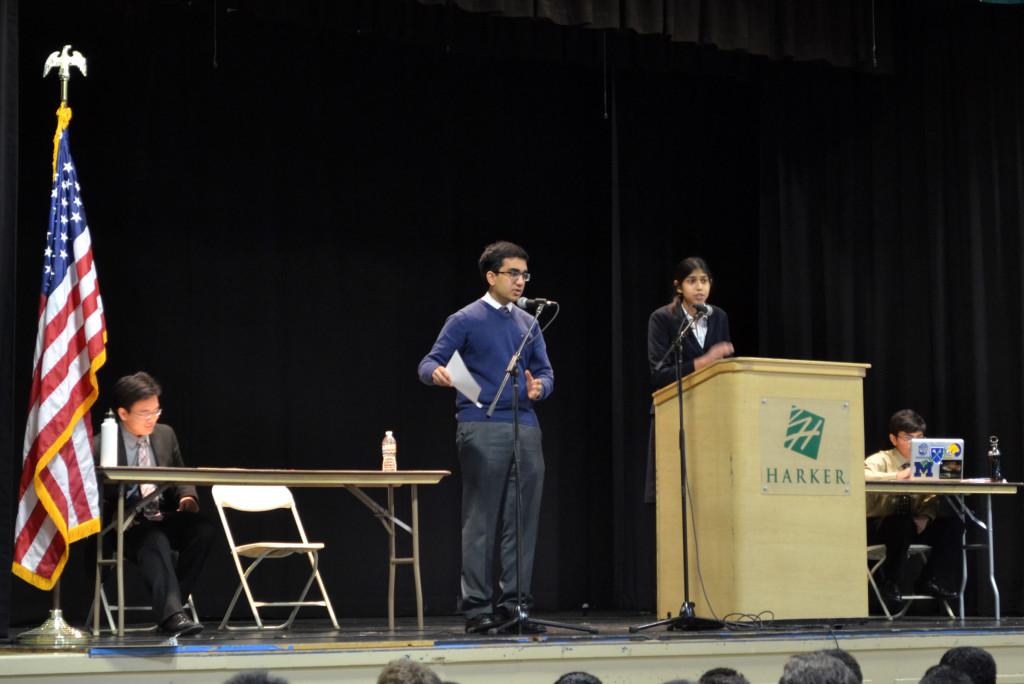Gun control assembly held by debaters
At 9:15 a.m. on Wednesday, students filed into the gym to attend the morning’s gun control debate held by the debate program.
The four students who participated argued for or against stricter gun control laws in the form of federal bans on semi-automatic weaponry and more thorough background checks on owners. Seniors Anuj Sharma and Warren Zhang argued for these extra measures while Ayush Midha (10) and Saachi Jain (11) argued against them.
The debate started with a round of constructives, each followed by cross examinations with an opposing debater.
The affirmative argued for a renewal of The Federal Assault Weapons Ban and universal background checks, citing several studies to back up their case. Anuj and Warren also suggested that reducing the availability of guns will consequently reduce the risk of mass shootings and diminish the effects of the violent drug trade in Mexico.
Fighting back, the negative, Ayush and Saachi, argued that criminals can easily circumvent laws and background checks by obtaining guns through theft or the black market. They also pointed out that background checks would be ineffective because of technology issues and a lack of shared databases.
“I could go to Canada and buy assault weapons,” Ayush said, eliciting chuckles from the audience.
The latter part of the hour-long debate consisted of rebuttals from each of the four debaters. Some viewers found these statements to be too repetitive.
“I felt that the debate provided good insight to the community as to what debaters actually do in general, but I felt that some of the points kept being repeated and refuted back and forth a little too many times,” Nicky Semeza (11) said.
Sophomore Felix Wu agreed that the debate represented both sides of the argument well, additionally identifying some drawbacks.
“I think overall the debate was very good as the speakers were articulate and obviously well prepared,” he said. “However, I thought it was a bit lengthy, and I would’ve liked to see an audience vote at the end.”
Other students also felt that the interactive element characteristic of assemblies was missing from the debate.
“It could have been improved by perhaps opening up to some interested audience members, or first taking an initial poll of the issue to gauge how the upper school feels about this issue,” Sanjana Kaundinya (10) said.
According to public forum debater Aneesh Chona (12), the debate’s purpose was to expose the student body to a wealth of viewpoints and to allow for a more balanced perspective on one of society’s more controversial issues.
The idea of the assembly was conceived by Ayush, who had talked to his debate teacher Gregory Achten. Initially, they had decided to host the debate during long lunch, but after discussing with Upper School Division Head Butch Keller, they chose to hold it as a school-wide assembly.
Trisha Jani is the news editor of The Winged Post. She is a senior and has been part of the journalism program since her freshman year. Her position on...
Vasudha Rengarajan is the Editor-in-Chief of Harker Aquila. As former Features editor and Sports editor for Aquila and a reporter for The Winged Post,...


















![“[Building nerf blasters] became this outlet of creativity for me that hasn't been matched by anything else. The process [of] making a build complete to your desire is such a painstakingly difficult process, but I've had to learn from [the skills needed from] soldering to proper painting. There's so many different options for everything, if you think about it, it exists. The best part is [that] if it doesn't exist, you can build it yourself," Ishaan Parate said.](https://harkeraquila.com/wp-content/uploads/2022/08/DSC_8149-900x604.jpg)




![“When I came into high school, I was ready to be a follower. But DECA was a game changer for me. It helped me overcome my fear of public speaking, and it's played such a major role in who I've become today. To be able to successfully lead a chapter of 150 students, an officer team and be one of the upperclassmen I once really admired is something I'm [really] proud of,” Anvitha Tummala ('21) said.](https://harkeraquila.com/wp-content/uploads/2021/07/Screen-Shot-2021-07-25-at-9.50.05-AM-900x594.png)







![“I think getting up in the morning and having a sense of purpose [is exciting]. I think without a certain amount of drive, life is kind of obsolete and mundane, and I think having that every single day is what makes each day unique and kind of makes life exciting,” Neymika Jain (12) said.](https://harkeraquila.com/wp-content/uploads/2017/06/Screen-Shot-2017-06-03-at-4.54.16-PM.png)








![“My slogan is ‘slow feet, don’t eat, and I’m hungry.’ You need to run fast to get where you are–you aren't going to get those championships if you aren't fast,” Angel Cervantes (12) said. “I want to do well in school on my tests and in track and win championships for my team. I live by that, [and] I can do that anywhere: in the classroom or on the field.”](https://harkeraquila.com/wp-content/uploads/2018/06/DSC5146-900x601.jpg)
![“[Volleyball has] taught me how to fall correctly, and another thing it taught is that you don’t have to be the best at something to be good at it. If you just hit the ball in a smart way, then it still scores points and you’re good at it. You could be a background player and still make a much bigger impact on the team than you would think,” Anya Gert (’20) said.](https://harkeraquila.com/wp-content/uploads/2020/06/AnnaGert_JinTuan_HoHPhotoEdited-600x900.jpeg)

![“I'm not nearly there yet, but [my confidence has] definitely been getting better since I was pretty shy and timid coming into Harker my freshman year. I know that there's a lot of people that are really confident in what they do, and I really admire them. Everyone's so driven and that has really pushed me to kind of try to find my own place in high school and be more confident,” Alyssa Huang (’20) said.](https://harkeraquila.com/wp-content/uploads/2020/06/AlyssaHuang_EmilyChen_HoHPhoto-900x749.jpeg)



